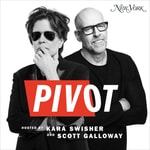Decoder with Nilay Patel – Details, episodes & analysis
Podcast details
Technical and general information from the podcast's RSS feed.

Decoder with Nilay Patel
The Verge
Frequency: 1 episode/4d. Total Eps: 857

Recent rankings
Latest chart positions across Apple Podcasts and Spotify rankings.
Apple Podcasts
🇨🇦 Canada - business
28/07/2025#65🇨🇦 Canada - business
27/07/2025#61🇬🇧 Great Britain - business
27/07/2025#79🇨🇦 Canada - business
26/07/2025#51🇬🇧 Great Britain - business
26/07/2025#88🇺🇸 USA - business
26/07/2025#99🇨🇦 Canada - business
25/07/2025#43🇬🇧 Great Britain - business
25/07/2025#65🇺🇸 USA - business
25/07/2025#83🇨🇦 Canada - business
24/07/2025#44
Spotify
No recent rankings available
Shared links between episodes and podcasts
Links found in episode descriptions and other podcasts that share them.
See allRSS feed quality and score
Technical evaluation of the podcast's RSS feed quality and structure.
See allScore global : 59%
Publication history
Monthly episode publishing history over the past years.
The AI election deepfakes have arrived
jeudi 29 août 2024 • Duration 45:06
Disney Is a Tech Company?
lundi 26 août 2024 • Duration 42:23
The Supreme Court ruling that could kill net neutrality
jeudi 25 juillet 2024 • Duration 38:09
Watching Silicon Valley Bank melt down from the front row with Brex CEO Henrique Dubugras
mardi 4 avril 2023 • Duration 01:04:51
The surprisingly complex business of toys, with Hasbro CEO Chris Cocks
vendredi 31 mars 2023 • Duration 01:10:34
Can Mastodon seize the moment from Twitter?
mardi 28 mars 2023 • Duration 01:18:37
How to play the long game, with New York Times CEO Meredith Kopit Levien
jeudi 23 mars 2023 • Duration 01:01:55
Taylor Swift vs. Ronald Reagan: The Ticketmaster story
mardi 21 mars 2023 • Duration 33:26
‘The Goliath is Amazon’: after 100 years, Barnes & Noble wants to go back to its indie roots
jeudi 16 mars 2023 • Duration 01:03:08
Why Spotify wants to look like TikTok, with co-president Gustav Söderström
mardi 14 mars 2023 • Duration 01:00:49









